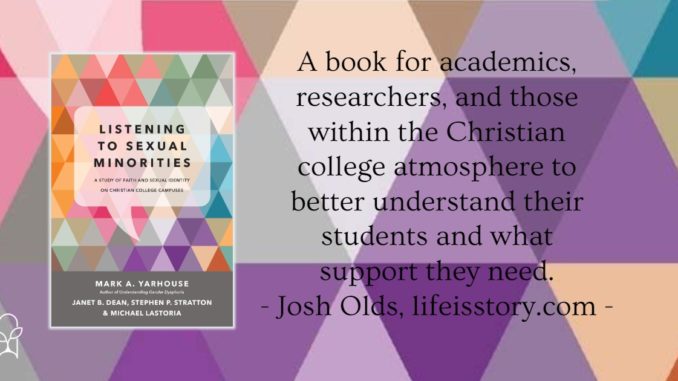
Also by this author: Gender Identity and Faith: Clinical Postures, Tools, and Case Studies for Client-Centered Care
Published by IVP Academic on April 24, 2018
Genres: Academic, Non-Fiction
Buy on Amazon
Goodreads

Students arrive on campus with various boxes of belongings to unpack, some heavy, some tidy, some more valuable, some more private. For many students, two of these boxes could be labeled "My Faith" and "My Sexuality"--and these two can be among the most cumbersome to handle. How to balance the two without having to set one down? How to hold them both closely, both securely, but still move forward to settle in with new friends in a new environment? How to keep from dropping one or the other, spilling its embarrassing contents for all to see? Such can be the struggle for any student, but especially for any sexual minority who identifies or struggles with an LGB+ identity or same-sex attraction on a Christian college campus. For these students their faith and their sexuality often feel both tender and in acute tension. Who is God making them to be? What do they need to grow in to develop faithfully, and what might they need to leave behind? How can they truly flourish? The research team of Yarhouse, Dean, Stratton, and Lastoria draw on their decades of experience both in the psychology of sexual identity and in campus counseling to bring us the results of an original longitudinal study into what sexual minorities themselves experience, hope for, and benefit from. Rich with both quantitative and qualitative data, their book gives an unprecedented opportunity to listen to sexual minorities in their own words, as well as to observe patterns and often surprising revelations about life and personal development both on campus and after graduation. Listening to Sexual Minorities will be an indispensable resource not only for counselors and psychologists but also for faculty, student-development leaders, and administrators in higher education as well as leaders in the church and wider Christian community who want to create an intentional environment to hear from and contribute to the spiritual flourishing of all.
For years, Mark Yarhouse has been the leading conservative evangelical scholar for LGBTQ+ issues. While he does not describe himself as affirming theologically, his practical academic understanding of sexual identity has led him to a perspective that’s a step up from most conservative conversations on the issues. Listening to Sexual Minorities is the result of a series of studies done by him and his team (Janet Dean, Stephen Stratton, and Michael Lastoria). The book does exactly what it claims, which is to simply listen to the viewpoints of sexual minorities on Christian college campuses.
That last phrase is quite important. Christian college campuses. The students being studied are in an environment which is usually not openly-affirming, and indeed may not be fully affirming themselves. The three main studies that comprise the book are a 2009 study done in tandem with the Council for Christian Colleges and Universities, a 2013 study supported by the Association for Christians in Student Development, and a longitudinal study supported by the ACSD.
Listening to Sexual Minorities is not a narrative style book. It is an academic study and the tone and content reflect that. Although the title is uses the most “listening,” the book’s focus is more on the data than the stories. While the results of interviews are included, the tone remains academic. It reads more like a dissertation than a typical non-fiction book. I don’t say that as a positive or negative, but rather to note that individuals expecting this to be a book of stories and memoir will find themselves disappointed. This is an academic treatise and it reads like it.
I appreciate that the authors, though perhaps not being affirming, make no attempts to moralize or pick apart the answers given by those in the study. They fairly, impartially, and truthfully record what they are told. The only problem that results from such academic aloofness is…well…the aloofness. Listening to Sexual Minorities is devoid of any sort of passion or emotion and its conclusions—that Christian colleges and universities should support their students regardless of sexual identity—is rather banal and basic. Such is academia, but it’s a bit disheartening that, after three hundred pages of dense research, the conclusion is “love your neighbor.” Not a bad conclusion, mind you, but a bit generic.
Listening to Sexual Minorities deftly steps around the issue of S-I-N, which some on the right will see as the major oversight of the book while others on the left are clutching pearls at the thought it would even be considered. The authors are not theologians and I respect their ability to remain within their academic expertise. Overall, the fact that it isn’t a larger issue shows how much progress has been made in respecting sexual minorities in the past forty years or so.
In the end, this is a book for academics, researchers, and those within the Christian college atmosphere to better understand their students and what support they need. I wish the authors had been more directed and specific in their conclusions or made more specific suggestions for providing a welcoming atmosphere for sexual minorities, or in detailing how sexual minorities can thrive in a non-affirming context.
